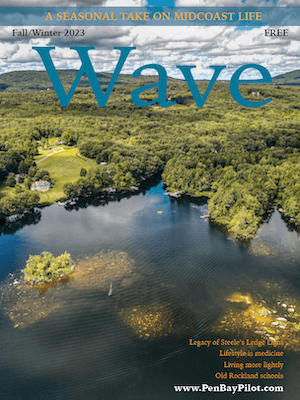ORONO — The College of Earth, Life, and Health Sciences made its debut during a town hall meeting at the University of Maine on Oct. 31, 2023.
The college, formerly known as the College of Natural Sciences, Forestry, and Agriculture, is the largest of UMaine’s six colleges, accounting for 26.5% of all university enrollments. Members of the newly named College of Earth, Life, and Health Sciences helped generate 41% of the university's research awards over the past year while driving impact across life, health, social and natural sciences.
“The name College of Earth, Life, and Health Sciences captures the breadth of our community’s impact. It comprehensively represents the systems and unique collaborations we foster,” said Diane Rowland, dean of the college and director of the Maine Agricultural and Forest Experiment Station, in a news release. “I am so grateful to the faculty, staff, students, partners and UMaine’s leaders who helped us develop this modern and vibrant representation of the teaching, research and service we deliver every day — to the state and the globe.”
The new name was selected from a shortlist advanced by a task force Rowland formed shortly after she assumed her current role in fall 2021. The task force, composed of faculty, staff and students, advanced an inclusive name development process that engaged with internal and external stakeholders. Through focus groups, surveys, community forums and other opportunities for input, the task force advanced a grassroots approach to rebranding a college that covers everything from climate change to clinical sciences. The deliberate approach also ensured that schools and departments had time to expend existing marketing and outreach materials prior to the new name’s adoption.
“As a member of the task force charged with collecting ideas for a new name, I was impressed by the energy and enthusiasm of my colleagues across the entire college,” said Todd Gabe, a professor at UMaine’s School of Economics. “I looked at the process as not just selecting a new name, but as a way to position our college to best serve our students, the state of Maine and our community of stakeholders around the world.”
The former name was adopted in 1996. At the time, the college oversaw UMaine’s natural resource programs like forestry and agriculture. In subsequent years, numerous other disciplines joined the college, including marine sciences, nursing, molecular and biomedical sciences, economics, social work, communication sciences and disorders, and earth and climate sciences. Faculty and staff of the college have previously advocated to rename the college. A request to consider elevating the profile of UMaine’s health and wellness programs was included in a white paper submitted to the then-dean, Fred Servello, in May 2020.
“For the last two years, the college has worked inclusively and thoughtfully to develop its new name, and I applaud everyone who has been part of this process. The new name represents the university’s commitment to earth, life and health sciences both in our state and globally,” said John Volin, executive vice president for academic affairs and provost for UMaine. “I look forward to working with the college to capitalize on this expanded recognition of our impact. I have no doubt that this modern and unique name will also resonate strongly with students now and into the future.”
Questions regarding the process should be directed to nsfadean@maine.edu.
About the University of Maine: The University of Maine, founded in Orono in 1865, is the state's land grant, sea grant and space grant university, with a regional campus at the University of Maine at Machias. UMaine is located on Marsh Island in the homeland of the Penobscot Nation. UMaine Machias is located in the homeland of the Passamaquoddy Nation. As Maine's flagship public university, UMaine has a statewide mission of teaching, research and economic development, and community service. UMaine is the state's public research university and a Carnegie R1 top-tier research institution. It attracts students from all 50 states and 86 countries. UMaine currently enrolls 11,571 undergraduate and graduate students, and UMaine Machias enrolls 763 undergraduates. Our students have opportunities to participate in groundbreaking research with world-class scholars. UMaine offers 77 bachelor's degrees and six undergraduate certificates, as well as more than 100 degree programs through which students can earn doctoral or master's degrees, professional master's degrees, and graduate certificates. UMaine Machias offers 18 associate and bachelor's degrees, and 14 undergraduate certificates. The university promotes environmental stewardship, with substantial efforts campuswide to conserve energy, recycle and adhere to green building standards in new construction. For more information about UMaine and UMaine Machias, visit umaine.edu and machias.edu.





















-page-001_00111.jpg?itok=-OOqh5TZ)
-page-001_18cfb.jpg?itok=1VajjwvN)
-page-001_24246.jpg?itok=O5BwbYqe)
-page-001_34b6d.jpg?itok=n4klhTwL)
-page-001_4ecf4.jpg?itok=oGekJdvJ)
-page-001_53818.jpg?itok=jklb5_hs)
-page-001_649e6.jpg?itok=sMjpHMOQ)
-page-001_75e17.jpg?itok=fM1ee9ED)
-page-001172f.jpg?itok=ehqZjoJl)




